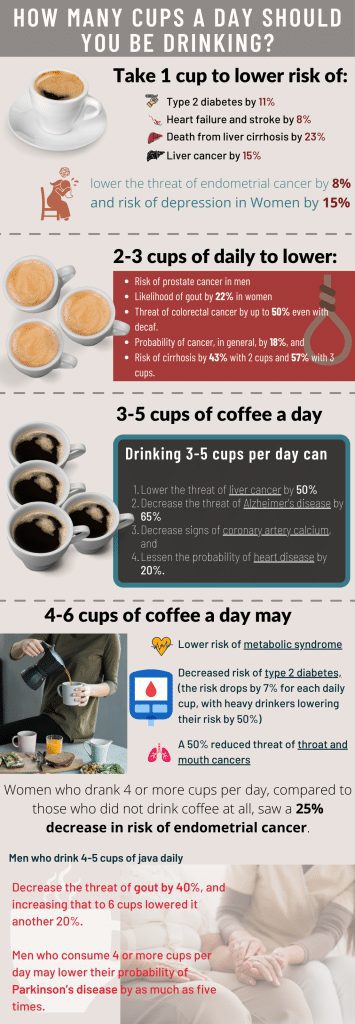If you’re a coffee lover, you’ve probably pondered how many cups of coffee a day is considered healthy.
It’s a topic that sparks curiosity, debates, and discussions among caffeine enthusiasts. While some swear by their daily intake of multiple cups, others worry about the potential adverse effects.
Today, we’ll explore the subject and clarify the recommended consumption of our beloved aromatic elixir.
So grab your favorite mug, and learn how to keep our coffee habits in check for a balanced and wholesome lifestyle!
Potential Health Benefits of Coffee
Reduced risk of heart disease
Coffee has been linked to a reduced risk of heart disease. Several studies have found that moderate coffee consumption is associated with a lower risk of developing heart disease.
The antioxidants and other beneficial compounds in coffee may help reduce inflammation and improve blood vessel function, leading to a healthier heart.
Lower risk of type 2 diabetes
Another potential health benefit of coffee is a lower risk of developing type 2 diabetes.
Research suggests that regular coffee consumption may improve insulin sensitivity and lower the risk of developing insulin resistance, a critical factor in developing type 2 diabetes. However, it’s important to note that adding excessive sugar or cream to your coffee can negate these potential benefits.
Improved cognitive function
Coffee has long been hailed for improving cognitive function and enhancing mental performance.
The caffeine in coffee stimulates the central nervous system and promotes alertness, focus, and concentration. It can also help improve reaction time and memory retention. However, consuming coffee in moderation is essential, as excessive consumption may lead to jitteriness and restlessness.
Increased metabolic rate
For those looking to boost their metabolism, coffee may offer a helping hand. Studies have shown that the caffeine in coffee can increase metabolic rate, which can help with weight management.
However, it’s worth noting that the effects of caffeine on metabolism may vary from person to person, and excessive intake can lead to unpleasant side effects such as increased heart rate and nervousness.
Enhanced athletic performance
Athletes and active individuals may benefit from moderate coffee consumption to enhance their performance.
Caffeine caffeine has been shown to increase endurance, improve muscle strength, and reduce muscle pain.
Additionally, coffee can help increase fat oxidation during exercise, aiding in weight loss and improving overall athletic performance.
Adverse Effects of Excessive Coffee Consumption
Increased anxiety and restlessness
While coffee can temporarily boost energy and improve alertness, excessive consumption can increase anxiety and restlessness.
The stimulating effects of caffeine may exacerbate symptoms of anxiety and contribute to feelings of jitteriness and nervousness. It’s essential to be mindful of your caffeine intake and listen to your body’s signals.
Sleep disturbances
One of the most well-known adverse effects of excessive coffee consumption is its impact on sleep.
Caffeine is a stimulant that can interfere with the body’s natural sleep-wake cycle. Consuming coffee too close to bedtime can lead to difficulty falling asleep and disrupted sleep patterns. Limiting caffeine intake is essential to promote healthy sleep, especially in the evening.
Digestive issues
Some individuals may experience digestive issues as a result of excessive coffee consumption. Coffee is known to have a laxative effect and can stimulate bowel movements.
While this can be advantageous for those who struggle with constipation, it may also lead to diarrhea or stomach discomfort in some individuals. It’s essential to know your body’s response to coffee and adjust your intake accordingly.
Dependency and withdrawal symptoms
Regular and excessive consumption of coffee can lead to dependency and withdrawal symptoms when attempting to cut back or quit.
Caffeine is a psychoactive substance, and prolonged exposure can lead to physical and psychological dependence.
Reduced intake or sudden cessation of coffee consumption can result in headaches, fatigue, irritability, and difficulties with concentration. It’s essential to be mindful of your caffeine intake and gradually reduce your consumption if needed.
Negative impact on bone health
While coffee has many potential health benefits, excessive consumption may negatively affect bone health. High intake of coffee has been linked to a higher risk of osteoporosis and an increased risk of fractures, particularly in postmenopausal women.
This may be attributed to the presence of substances in coffee that interfere with calcium absorption and increase calcium excretion through urine. Discussing your coffee consumption with a healthcare professional is essential if you have concerns about your bone health.
Recommended Daily Coffee Intake
General guidelines
The general guideline for healthy coffee consumption is to limit your intake to moderate levels. According to various health organizations, including the American Heart Association, consuming 3 to 5 cups of coffee daily is considered moderate and generally safe for most healthy individuals.
Individual variations in caffeine sensitivity
It’s important to note that individual caffeine sensitivity can vary greatly. Some individuals may experience adverse side effects from even small amounts of caffeine, while others may tolerate higher amounts without issue. It’s essential to be mindful of your body’s response to coffee and adjust your intake accordingly.
Consideration of other dietary factors
When determining your daily coffee consumption, you must consider other dietary factors and potential sources of caffeine.
Many foods and beverages, such as chocolate, energy drinks, and certain medications, can contribute to your overall caffeine intake. It’s essential to consider these sources and your coffee consumption to ensure you’re not exceeding the recommended limits.
Pregnancy and breastfeeding
Coffee consumption during pregnancy and breastfeeding should be given special consideration. The caffeine in coffee can cross the placenta and affect the developing fetus.
Additionally, caffeine can pass into breast milk and may affect the breastfed baby. Pregnant women are generally recommended to limit their caffeine intake to 200 mg per day (equivalent to one 12-ounce cup of coffee), and breastfeeding women may also want to consider limiting their intake.
Factors Influencing Caffeine Tolerance
Genetic factors
Genetics plays a significant role in determining an individual’s caffeine tolerance. Genetic variations can affect how quickly your body metabolizes caffeine and your sensitivity to its effects.
Some individuals may be fast metabolizers and require higher amounts of caffeine to experience the same effects. In contrast, others may be slow metabolizers and need to be more cautious with their intake.
Age
Age can also influence caffeine tolerance. As we age, our metabolism tends to slow down, and our bodies may become more sensitive to the effects of caffeine.
Older adults may need to be more cautious with their coffee consumption and consider reducing their intake to avoid adverse effects such as sleep disturbances or increased anxiety.
Body mass and composition
Body mass and composition can impact caffeine tolerance as well. Generally, individuals with a higher body mass may require more significant amounts of caffeine to experience the same effects as those with a lower body mass.
Additionally, individuals with a higher percentage of lean muscle mass may metabolize caffeine more efficiently, while those with higher body fat may experience prolonged caffeine effects.
Medications and health conditions
Certain medications and health conditions can interact with caffeine and influence its effects on the body.
For example, individuals taking certain medications for heart conditions or mental health disorders may need to limit their caffeine intake due to potential interactions. Additionally, individuals with underlying health conditions such as high blood pressure or gastroesophageal reflux disease may need to be cautious with their coffee consumption to avoid exacerbating symptoms.
Healthy Coffee Drinking Habits
Timing of consumption
Timing your coffee consumption can help maximize its potential benefits while minimizing its adverse effects.
It’s generally recommended to avoid consuming coffee too close to bedtime, as caffeine’s stimulating effects can interfere with sleep. Instead, enjoy your coffee in the morning or early afternoon to allow enough time for the caffeine to be metabolized before bedtime.
Avoiding excessive additives
While a plain cup of black coffee is relatively low in calories and a good source of antioxidants, adding excessive sugar, cream, or flavored syrups can significantly increase the calorie content and potential adverse health effects. Be mindful of your additional ingredients and consider healthier alternatives, such as unsweetened almond milk or a natural sweetener like stevia.
Choosing organic and high-quality coffee
Opting for organic and high-quality coffee can ensure you enjoy a beverage free from synthetic pesticides and other potential contaminants.
Organic coffee is grown without synthetic fertilizers or pesticides, making it a healthier choice for you and the environment. Additionally, high-quality coffee sourced from reputable suppliers often has a better flavor profile and may provide a more enjoyable drinking experience.
Balancing coffee with water intake
Coffee is a diuretic, which can increase urine production and potentially contribute to dehydration.
To counteract this effect, it is crucial to balance coffee consumption with adequate water intake. Aim to drink a glass of water alongside each cup of coffee to help maintain hydration and support overall health.
Alternatives to Coffee
Herbal teas
If you’re looking for a caffeine-free alternative to coffee, herbal teas can be a great option. Depending on the herbs used, herbal teas come in various flavors and offer potential health benefits.
Chamomile, peppermint, and ginger teas are famous for their calming and digestive properties. Rooibos tea is another caffeine-free option with antioxidants and a rich, earthy flavor.
Decaffeinated coffee
Decaffeinated coffee is a popular choice for those who enjoy the taste of coffee but want to limit their caffeine intake.
The caffeine content in decaf coffee can vary, but it is generally significantly lower than regular coffee. It’s important to note that decaffeination may involve using chemicals, so opt for organic or water-processed decaf coffee whenever possible.
Mushroom coffee
Mushroom coffee is a unique alternative that combines coffee with medicinal mushrooms such as lion’s mane or chaga. These mushrooms offer potential health benefits, including improved cognitive function and immune support.
Mushroom coffee typically contains less caffeine than regular coffee, making it a suitable choice for those looking to reduce their caffeine intake while enjoying the flavor and potential health benefits.
Golden milk
Golden milk, or turmeric latte, is a warm beverage made with turmeric, milk (or a plant-based alternative), and various spices like cinnamon and ginger.
Turmeric contains curcumin, known for its anti-inflammatory and antioxidant properties. Golden milk is caffeine-free and offers a soothing and nutritious alternative to coffee. It can be enjoyed hot or cold and is often used as a natural remedy for various health conditions.
Monitoring and Assessing Personal Response to Coffee
Recognizing signs of caffeine sensitivity
Caffeine sensitivity can vary significantly among individuals. Some people may experience adverse side effects even with small amounts of caffeine, while others may tolerate higher amounts without issue.
It is essential to know how your body responds to coffee and recognize signs of caffeine sensitivity, such as increased heart rate, jitteriness, anxiety, or sleep disturbances. Adjust your consumption accordingly to maintain a healthy balance.
Keeping track of daily coffee consumption
Track your daily coffee consumption can help you maintain a healthy and balanced intake. Set a limit based on your tolerance and the recommended guidelines, and track the cups you consume daily. This can help you establish a routine and be more mindful of caffeine intake.
Listening to the body’s signals
Ultimately, the best way to determine your ideal coffee consumption is to listen to your body’s signals and adjust accordingly. Pay attention to how coffee makes you feel physically and mentally. If you notice any adverse effects or an inability to sleep well, consider reducing your consumption or exploring alternatives. It’s essential to prioritize your overall well-being and ensure that your coffee habits align with your needs and preferences.
Expert Opinions and Studies
American Heart Association’s stance
The American Heart Association (AHA) recognizes that coffee, if consumed in moderation, can be part of a healthy diet.
They suggest a daily limit of three to five cups of coffee for most healthy individuals, which aligns with the general guidelines mentioned earlier. However, it’s important to note that the AHA advises against excessive consumption of sugar and added fats that may accompany coffee, as these can have adverse health effects.
European Food Safety Authority’s recommendations
The European Food Safety Authority (EFSA) has also provided recommendations regarding coffee consumption.
They have determined that a caffeine intake of up to 400 mg daily is unlikely to have adverse health effects for the general adult population. As mentioned earlier, pregnant women and individuals sensitive to caffeine may need to follow different guidelines.
Studies on coffee and health
Numerous studies have explored the potential health effects of coffee consumption. Some have found positive associations between coffee consumption and reduced risk of various conditions, such as heart disease, type 2 diabetes, and certain types of cancer.
However, it’s important to note that these findings often depend on moderate coffee intake, and excessive consumption may negate these potential benefits or even lead to adverse health effects.
Research in this area is ongoing, and it’s always best to consider a balanced approach to coffee consumption.
Precautions for People with Certain Conditions
High blood pressure
Individuals with high blood pressure may need to be cautious with their coffee consumption, as caffeine can temporarily raise blood pressure levels.
However, research in this area is inconclusive, and individual responses may vary. It’s advisable for those with high blood pressure to monitor their caffeine intake and consider consulting with a healthcare professional for personalized guidance.
Gastroesophageal reflux disease (GERD)
For individuals with gastroesophageal reflux disease (GERD), coffee may worsen symptoms such as heartburn and acid reflux.
The acidic nature of coffee can irritate the esophagus and contribute to digestive discomfort. If you have GERD, it may be advisable to limit or avoid coffee altogether and explore alternatives that are less likely to trigger symptoms.
Panic disorder and anxiety disorders
Caffeine can exacerbate symptoms of panic disorder and anxiety disorders. Individuals with these conditions may be more sensitive to the stimulating effects of caffeine and may experience increased anxiety, restlessness, or heart palpitations. Be mindful of your caffeine intake and consider reducing or eliminating coffee if it worsens your symptoms.
Insomnia and sleep disorders
Consuming coffee, especially in the evening or close to bedtime, can disrupt sleep patterns and contribute to insomnia or worsen existing sleep disorders.
Limiting or avoiding coffee in the hours leading up to bedtime is advised if you struggle with sleep. Opt for caffeine-free alternatives or herbal teas that promote relaxation and restful sleep.
Final Thoughts on Coffee Consumption
Individual tolerance and preferences
Individual tolerance and preferences play a significant role in coffee consumption. What works for one person may not work for another.
It’s essential to consider your body’s response to coffee, monitor any potential side effects, and adjust your intake accordingly. If coffee negatively impacts your health or well-being, it may be worth exploring alternatives or reducing your consumption.
Balancing potential benefits and risks
As with many things in life, balance is critical in coffee consumption. While coffee can offer potential health benefits, excessive consumption or reliance on caffeine can lead to adverse effects.
It’s essential to weigh the potential benefits against the risks, consider your circumstances, and make informed choices about your coffee intake.
Consulting with healthcare professionals
You should consult with healthcare professionals, such as your doctor or a registered dietitian, regarding your coffee consumption if you have specific health concerns or conditions.
They can provide personalized advice based on your needs and help you navigate potential interactions or considerations.
Everyone’s health journey is unique, and seeking professional guidance can help ensure that your coffee habits align with your overall well-being.










































